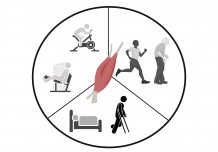
The research will take place at the Nutritional Physiology Research Unit at the University of Exeter's St Luke's Campus
Researchers at the University of Exeter are recruiting participants aged 35-65 to investigate how the amount we eat affects muscle mass as we age.
Fit and healthy males and females are invited to take part in a new research study looking at the impact of energy intake and short-term disuse on skeletal muscle in middle-aged adults.
The purpose is to determine how energy intake (also known as caloric intake) affects muscle mass during normal "free-living" conditions, and during a short period of immobilisation.
Postdoctoral researcher Alistair Monteyne, from the University of Exeter's Sport and Health Sciences department's Nutritional Physiology Research Group, said: "The study will help us to understand how the energy we consume affects our ability to preserve muscle tissue as we age, including in situations where we might be immobilised; injury or illness, for example".
The study involves metabolic testing, including the sampling of blood and muscle, over a structured eleven-day period, during which time participants will be provided with a fully controlled diet.
Participants will also undergo three days of single-leg immobilisation, preceded and succeeded by MRI scans.
The research will take place at the Nutritional Physiology Research Unit at the University of Exeter's St Luke's Campus and participants will be paid £100.






